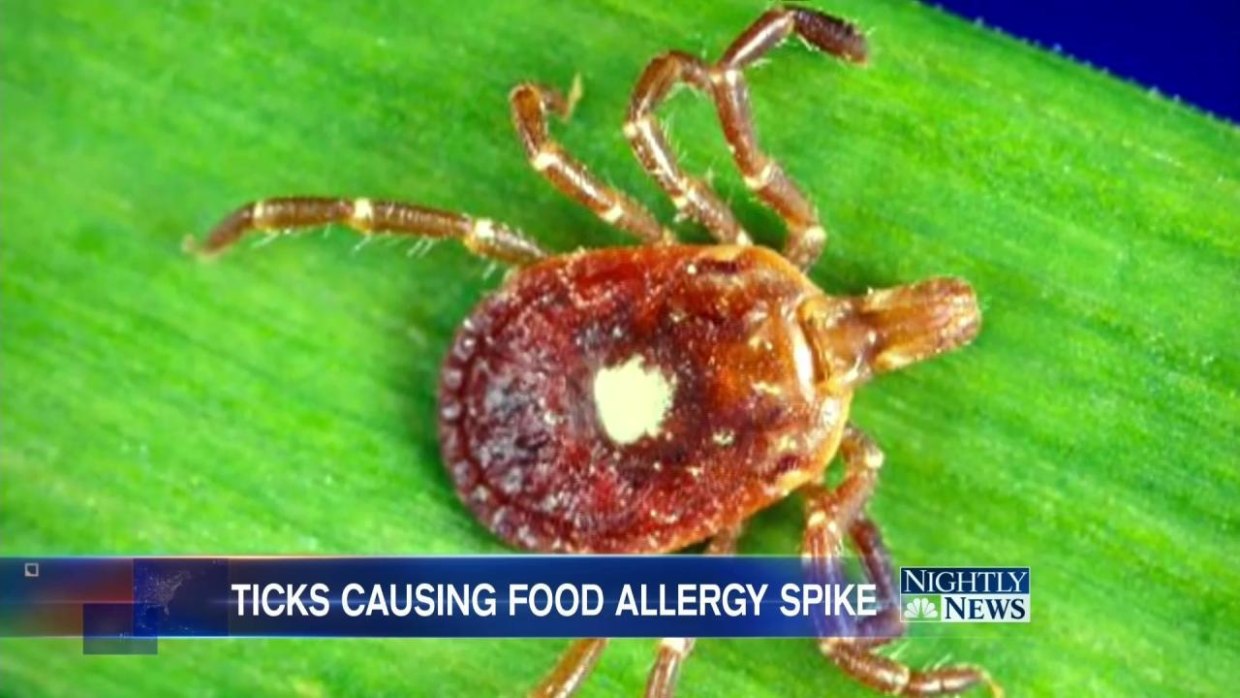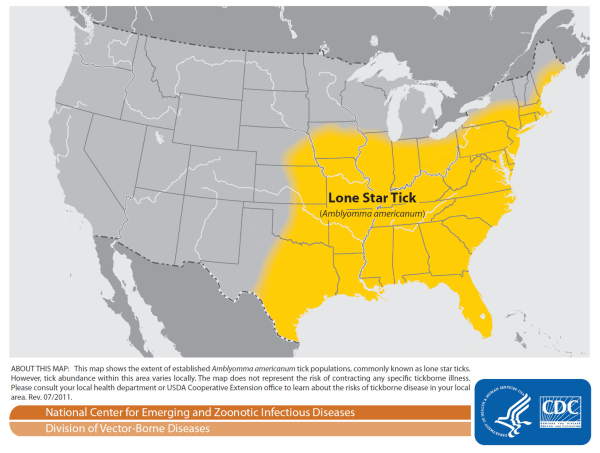
The painful reaction started in the middle of the night. September Norman of Hendersonville, Tennessee, remembers waking up "itching like a fiend."
"I thought something had bitten me and I tried drinking water to flush it out," she says. A couple of hours later, her lips and tongue swelled up. Frightened, she woke her husband. "He took one look at me and said we have to go get help." EMS workers later told Norman she might have died if she'd gone without treatment for another 20 minutes.
Once doctors learned that Norman, 56, had been bitten by a tick and had eaten a steak for dinner, she was tested for antibodies to a carbohydrate molecule named alpha-gal, which has been implicated in tick-related meat allergies. She tested positive.
A tick-related meat allergy has been quietly spreading across the southern and eastern U.S. over the past two decades, but in recent years the number of cases have steadily risen. A tick bite in some people can kick off a sensitivity to red meat that can result in symptoms such as itching, hives, swollen lips and breathing problems. The reaction can sometimes be life threatening.
"We know at this point that there are over 3,500 cases," says Dr. Scott Commins, an associate professor of medicine and pediatrics in the division of rheumatology, allergy & immunology at the Thurston Research
Center at the University of North Carolina, Chapel Hill. "I think there are many more."
The Centers for Disease Control and Prevention doesn't have data on the number of people who have developed the allergy, but Commins estimates that in the areas where the lone star tick is common, 1 to 5 percent will develop it. At UNC alone, there are 350 patients with the allergy, known as alpha-gal syndrome.
"I know of a practice in Kentucky that has over 100 cases and there is a group down in Georgia near Savannah that has over 50 cases," Commins says.

Spread of the Lone Star tick. CDC
At Vanderbilt University, the syndrome was rarely seen a few years ago. Now, the university's doctors are treating 160 patients with the syndrome.
Scientists currently believe lone star ticks pick up alpha-gal after biting a deer, says Dr. Andrew Nickels, an assistant professor of medicine and pediatrics at Vanderbilt.
When the tick later bites a human, it passes along the alpha-gal, a substance found in all red meats, including beef, pork, lamb and venison.
It's thought that in some people the immune system spots alpha-gal as soon as it enters the blood stream and flags the unfamiliar molecule as an enemy invader.
When someone is sensitized to alpha-gal, meat consumption can lead to a host of symptoms, which can include hives; swollen lips, eyes, tongue and throat; respiratory issues; vomiting; diarrhea; increased heart rate and low blood pressure.
Diagnosis of alpha-gal syndrome can be difficult because the allergic reaction is delayed — three to six hours after exposure, compared to minutes for other food allergies.
Also, some people don't have obvious allergic symptoms.
"Some just get terrible stomach upset and bad abdominal cramping six hours after eating beef," Commins says. "We are concerned these patients are not coming in to get medical attention."
There are a lot of unanswered questions about the syndrome.
"We don't know if there is a predisposition that some people have that makes them more likely to develop an allergy after being bitten," says Dr. Anesh Adalja, an infectious disease specialist at the University of Pittsburgh Medical Center. "We don't know how many times someone has to be bitten before they develop the allergy. The lone star tick has been around for a long time and people have been bitten for a long time.
Why are we seeing this now?"
Although there is no cure for the syndrome, some people seem to recover if they aren't bitten again by a tick, Commins says. Those who remain sensitized are told to avoid all red meats and gelatins, and in some patients, even dairy foods.
Some two years after the tick bite, Norman has become so sensitive she can't even handle meat to cook a meal for her family.
"It burns my hands," she says. "If I have chicken cooked on a grill where meat has been cooked, I have a reaction. It's hard to go out to eat because I have to go through my spiel and instead of cooking my chicken or fish on a grill they have to put it in a sauté pan."
She's realized that she can't leave anything to chance.
"I carry an EpiPen everywhere I go. I wear a medical alert bracelet because I am also allergic to gelatin and it is in a lot of IVs. If I were in a car accident and they put an IV in me, they could kill me. I can't take a flu shot or the shingles shot because they all contain gelatin. You have to be diligent and take care of your own health."
No comments:
Post a Comment